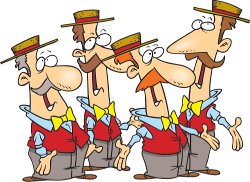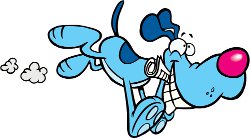Distributives
Distributives are English determiners that tell how people or things are divided or shared within a group.
Click Here for Step-by-Step Rules, Stories and Exercises to Practice All English Tenses
The English distributives are:
(clicking on the links will take to you directly to a description of each distributive.)
Distributives are placed before the noun or noun phrase they are "distributing."
EACH, EVERY, EITHER, and NEITHER can be used with singular nouns.
EACH, EITHER, and NEITHER can be used with plural nouns when the word "of" is added after the distributive.
Examples:
- Each
man is wearing a hat.

- Each
singing man is wearing a hat.
- Each
of the
men is wearing a hat.
- Each
of the
singing men is wearing a hat.
- Every
man is wearing a hat.
- Every
singing man is wearing a hat.

- Neither man
is wearing a tie.
- Neither of these men
is wearing a tie.
- Neither the
first man nor
the second man is wearing a tie.
- Either dog
would make a good pet.

- Either
of the
dogs would make a good pet.
- You can pick either
dog to take home.

- We will take home either the blue dog
or the yellow dog.
- You can pick either of the two dogs to take home.
English Distributives
A) Each
Each is a way of referring to the individual people or
things in a
group.Each can be used with singular nouns.
Each can be used with plural nouns by adding the word "of".
Examples:
- I want each
of you to write a book review.
- Each employee
has an office.
- Each
ham sandwich has two slices of bread.
- Each of
the students brought a computer to class.
B) Every
Every
is a way of including each person or thing when you talk about a
group. It also tells how often something happens.Examples:
- We go to church every
Sunday.
- Every third
day, I balance my checkbook.
- Every teacher
has 20 students.
- She is perfect in every
way.
C) Either
Either is used when you talk about a choice between two people or things.
Either means "one or the other."
Examples:
- Either
movie sounds exciting! (Both movies sound exciting.)
- I will buy either
the black one or the white one.
- I do not understand either
language.
- I do not like either
one!
D) Neither
Neither is the opposite of either.
Neither means "not either" or "not one and not the other."
Neither is sometimes paired with "nor".
Examples:
- Neither movie
sounds exciting. (Both movies sound boring.)
- Neither the
first movie nor the second movie sounds exciting.
- Neither of
them came to my wedding.
- Neither Sally nor John came to my wedding.
Either and Neither can only be used when there are two options.

- Either
John
or Sandy
will get the job.
- Neither
John
nor Sandy
was fired.
- Neither
employee was fired.
- I invited two friends, but neither came.
If you are speaking of more than two things or people, you should use any, no one, or none.
- Any
person
could get the job.

(There are more than two people applying for the job.)
- None
of the employees
was fired.
(There are more than two employees.)
- I invited ten friends, but no one came.
These were the uses of Distributives. Now that you know them, it is time to practice! Get our ESL Books.
Get Updates, Special Offers, and English Resources
Download your FREE GIFT (the first two chapters of
English Short Stories Book and Workbook)
as soon as you join!

By submitting your email, you consent to receiving updates and newsletters from us and to the sharing of your personal data with third parties for the purposes of sending you communications. We will not spam you. You can unsubscribe at any time. For more information, please see our privacy policy.





